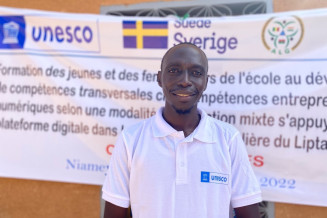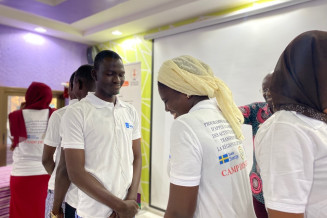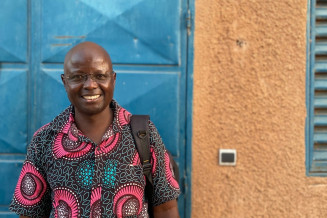As part of “Joint Regional Program to Support the Implementation of Cross-Border Cooperation Activities in the Liptako-Gourma Region” funded by the Swedish International Development Cooperation Agency (SIDA), UNESCO trained young people and women Liptako -Gourma in the development of key transversal competencies through a digital platform”, among other activities. Through online training, these young people were also trained in self-management of personal problems.
On October 27, 2022, UNESCO Dakar Project Team, along with Les Amis De l'Ecole (LADE), held a one-day camp for 32 Nigeriens. These youth completed the online training on transversal competencies and then reflected on this experience in order to reinforce what they had learned.

Achieving basic objectives
Insecurity makes it difficult for people to meet basic ends. Transversal skills development could change this.

Yacouba does not feel safe in living in Tillabéri at the moment:
Although Yacouba enjoys his work as a Scouts teacher, he is struggling to make ends meet. Apart from his voluntary involvement with the scouts, he looks for other activities on a daily basis to earn a little money. He continues:
Because of his family’s financial difficulties, they were forced to scatter everywhere in the country. Yacouba sometimes wonders if he will ever again meet some of his brothers who now live in Agadez.
Yacouba shares his first thoughts on an online transversal-skillsets training program offered by UNESCO. Initially, he was somewhat skeptical. He felt that, for him and other young people, financial support was the most pressing need. He explains:
His experience with the online training reassured him of his conviction that having multiple diplomas is less important, especially when people struggle every day just to meet their ends.
Flexible online training
Flexible online training provides Nigerien young people with a chance to learn anytime, anywhere.

Rafiya is running a small business in her hometown in Tillabéri. As an extrovert, she always tries to find something to do, which explains her entrepreneurial sprit. Youssouf is from Say in the same region. He works as an educator at a Scout center. Both Rafiya and Youssouf believe that building new skillsets can, in the long term, help young people to explore ways to change their lives.
Rafiya feels helpless, but contends that the government should take more serious measures to bring peace back to their community:

When asked why he decided to join the online training program on transversal skills development, Youssouf said:
Developing skills in young people
Developing skills in young people is important to enable them to grow, cope with their problems, and resist negative influences.

Abdoulaye Amadou supports the (re)integration of children and young people who live with difficulties. He is very concerned about the rapid surge in organized crime in Niger. Life is hard for many young Nigeriens, who are vulnerable to organized crime – as potential perpetrators and victims. Some are tempted to work with terrorist groups in order to earn money and support their families because the few odd jobs that are available are generally insufficient.
Despite the current situation in Niger, Abdoulaye believes that, as long as there are people, opportunities, demand and jobs will exist. He has been training young people in order to identify these local opportunities. He maintains that:
A growing body of literature indicates that transversal skills are critical in anticipating long-term life outcomes, such as labor market outcomes, and social and health behaviors. Transversal competencies can help young people like Yacouba, Rafiya and Youssouf to identify personal qualities that enable them to effectively navigate their environment, emphasize well with others, set clear life goals, and achieve them. In a place like Liptako-Gourma, meaningful skills training and development is much needed as these skills can be applicable across sectors and complement the acquisition of technical and academic skills. With proper, continuous support, we hope that young Nigeriens continue to create positive outcomes across important areas of their lives and determine a set of core skills relevant to their daily lives.









